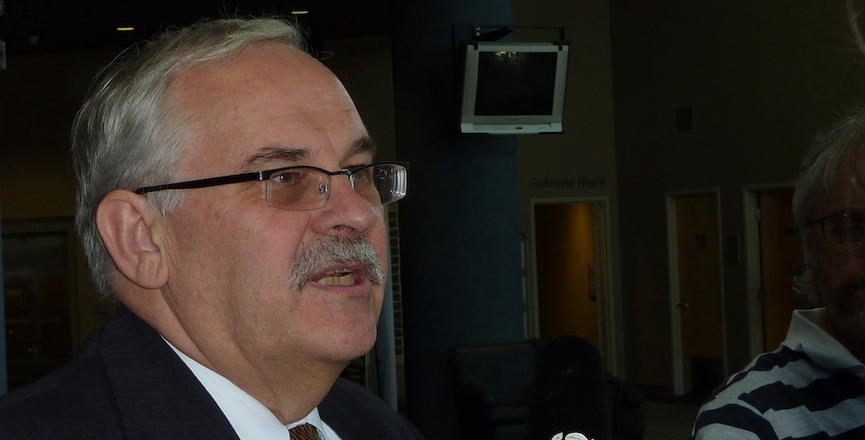A few Albertans may still remember Dr. Stephen Duckett, the remarkably undiplomatic Australian health economist hired by premier Ed Stelmach’s Progressive Conservative government to run the then-just-created Alberta Health Services in 2009.
Duckett had a stellar resumé and was obviously great in an interview. However, it turned out, he didn’t speak Albertan. Most Albertans can’t speak Australian. This led to problems.
It didn’t help that almost as soon as they hired him, the PCs tried to cut a billion dollars out of the AHS budget. Before you knew it, Duckett became a lightning rod for everything that was going wrong in the province’s health-care system under the Tories. Trouble was, some of the bolts of lightning passed right through Duckett and landed uncomfortably close to the PCs.
So, smart though he obviously was, after a while nobody around here wanted to listen to his prescriptive prescriptions, all delivered in an Aussie twang that Albertans of all political stripes found increasingly irritating.
After less than two years on the job, Duckett was fired by the Alberta Health Services board for telling a group of reporters he wouldn’t talk to them about emergency room waiting times because he was eating a cookie. “I’m eating a cookie,” he kept telling reporters as he strode away from their scrum in front of a downtown Edmonton hotel, steps away from AHS’s main offices. “Can’t you see I’m eating my cookie?”
Board chair Ken Hughes pulled the lever of the trapdoor, but who can doubt that it was premier Stelmach’s office that had finally had enough?
Hughes later said he didn’t actually fire Duckett, they just “jointly agreed it is time to move forward.” Whatever it was, Duckett was paid out his entire year’s salary, benefits, bonuses and an amount to cover contingent liabilities. It added up to $735,630, so not just cookie dough!
Duckett packed up and returned to Australia where he found a job at the Grattan Institute, a respectable think tank devoted to public policy issues, running a program that thinks up big ideas about health.
It may be the ideal position for the man. He knows the field, it’s difficult to be too blunt when you’re writing about policy ideas instead of trying to implement them, and, of course, nobody’s bothered by his Australian accent.
In that role Duckett was one of the authors of a policy proposal published in September that argued the best way for governments to deal with SARS-CoV-2, the virus that causes COVID-19, is to aim for zero active cases, and take tough measures to get there and stay there.
Grattan’s four-point plan is summarized on page four of the report:
- Governments should be explicit about their goal of zero active COVID-19 cases in the community and their plans to hit this target.
- Governments should be clear to the public about conditions under which restrictions will be phased out or brought back in.
- Governments should improve public health efforts.
- Once Australia gets to zero cases, governments should use frequent testing and international quarantines to seek to stay at zero cases.
Point three, just to be clear, included lots of COVID tests, fast contact tracing, mandatory masking and economic supports for people forced to miss work.
The Australian state of Victoria, where the Grattan Institute is based and which has a population of about 6.4 million, largely adopted the plan.
It worked.
As of yesterday Victoria has gone 37 days without a single new case. No one was in intensive care with COVID-19. Indeed, no one was hospitalized with the disease.
Effective today, the state government has eased restrictions, allowing private residences to have up to 30 visitors a day, increasing permissible public gatherings to 100 and easing masking rules. Private offices can bring back half of their employees. Nightclubs will be allowed to reopen.
This wasn’t all Duckett’s doing, obviously. It helps that Australia doesn’t have to share its continent with another country. Still, his contribution didn’t hurt.
Meanwhile, as the Victorian state government was accepting the recommendations of Duckett’s team, the United Conservative Party government of Premier Jason Kenney was doing the opposite on every count.
Kenney has explicitly ruled out aiming for zero cases.
The UCP government has never been clear about when or why restrictions might be brought back, if indeed there are any circumstances in which they would be. All we know is that if we don’t knock it off, Kenney has threatened to call us down to the office and yell at us.
His government has shown no willingness to improve public health efforts, and its dog whistles to its anti-mask, anti-vaccine fringe encourage anti-social citizens to ignore what measures have been half-heartedly adopted.
There are no clear instructions on how to enforce infractions. There are few or no efforts to penalize participants the large anti-mask gatherings in Edmonton and Calgary, one of them involving a long-time friend and political ally of the premier.
And Kenney has instituted measures to make it easier for travellers to come to the province with few or no restrictions on where they go or what they do when they get here.
Yesterday in Alberta, population 4.4 million, there were 1,836 new cases, 19 additional deaths bringing the total to 615; 19,484 active cases, more than 600 of them in hospital and 100 in ICU. We’re taking about inviting the Canadian army to pitch field hospital tents in parking lots.
By comparison, the Alberta-wide swivet about ER waiting times a decade ago seems quaint, and the situation in Australia today seems positively idyllic.
That’s more than just the way the cookie crumbles!
David Climenhaga, author of the Alberta Diary blog, is a journalist, author, journalism teacher, poet and trade union communicator who has worked in senior writing and editing positions at The Globe and Mail and the Calgary Herald.
Image: David J. Climenhaga



